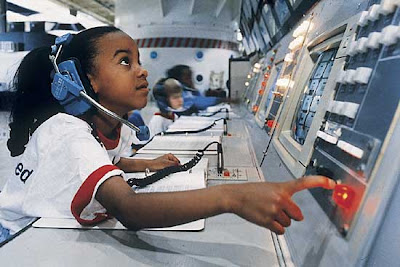And now, out in paperback...
 Seems the hardbacks are getting harder to come by, but it's also being released on Kindle today. I'm beginning to think people have too much time on their hands. But then, if it inspires space buffs, I'm all for it.
Seems the hardbacks are getting harder to come by, but it's also being released on Kindle today. I'm beginning to think people have too much time on their hands. But then, if it inspires space buffs, I'm all for it.As Stephen Hawking said, it's odd that at the pinnacle of scientific achievement in many fields, fewer and fewer youngsters aim to be scientists. Why is that, exactly? It cannot possibly be a shortage of reading material... I lost track of all the space-related materials released this month to coincide with the Apollo anniversary.

Do kids still do this? Do we need them to? Laugh if you like, but the boys in that picture probably thought we'd have an entire colony on Mars now. Why don't we? And what will kick start the next wave? Will civilians be routinely launched into orbit? Are private sector billionaires poised to spur interest in new rocket science technologies where once only space agencies ruled?
If we plan to get to Mars by the 2030s or 2040s, and the average age of a spacefaring explorer is about 37 years old, take a look around you at the age range that will be in training when we finally have the technology to make a Mars landing a reality.
 Laugh again, but you're looking at the future -- I hope. They're either about to take Driver's Ed class... or downloading Jonas Brothers tunes to their iPods. That's right, the ones with the toe rings and the spiky haircuts who won't pull up their pants... right down to the ones having Disney princess parties and water pistol wars.
Laugh again, but you're looking at the future -- I hope. They're either about to take Driver's Ed class... or downloading Jonas Brothers tunes to their iPods. That's right, the ones with the toe rings and the spiky haircuts who won't pull up their pants... right down to the ones having Disney princess parties and water pistol wars.They're going to Mars. Around the time I'm finally dipping into my IRA and learning how to knit. Food for thought. And it makes me want to buy every kid alive under the age of 15 a book about space travel... a Buzz Aldrin action figure... tickets to a planetarium... a toy rocket... a week at Space Camp...


































































